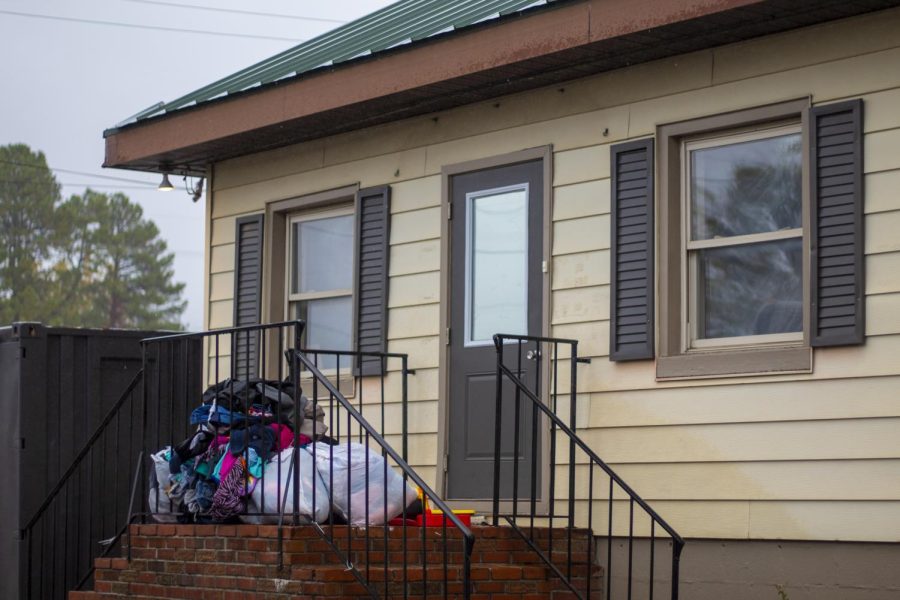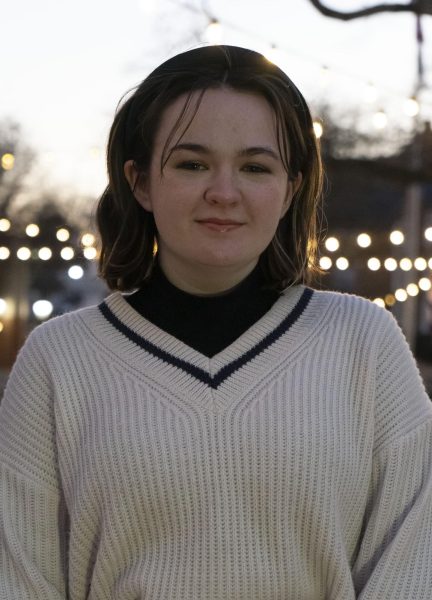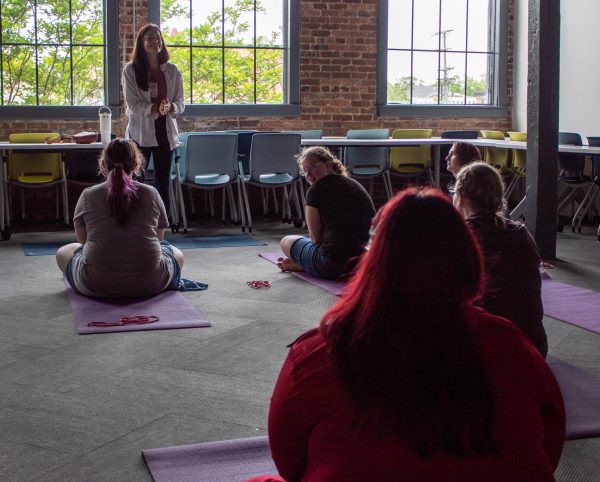Room in the Inn Shoals adjusts to changes
November 3, 2022
Room in the Inn, Florence’s non-profit directed toward the unhoused population, has faced many trials and difficulties since its conception. This year, they find themselves without an intake center.
The non-profit has faced push-back from Florence city government. Room in the Inn has already gone through three intake centers, with their Veterans Drive location recently closing down. The closing was formally announced on their Facebook page on Oct. 24.
“As some of you know we no longer have our Intake Center on Veterans Drive and we were unable to find a new location,” the statement read. “Because of that, we weren’t sure if we’d be able to operate this season. However, when you are committed to a mission, there is always a solution, even when it doesn’t look as you thought it would. So after much discussion and planning, we will be operating this winter – but in a limited capacity.”
Room in the Inn was created in 2012 by Krista Manchester and Beth Howard. Manchester has served as executive director since its conception.
Manchester, who was homeless as a teenager, saw Florence’s homeless freezing to death in cold winters. The winter of 2012 was an extremely cold one. Temperatures rapidly dropped from 73 degrees Fahrenheit at the beginning of the month to 27 degrees by the end of the month. Their main goal was to provide a warming center for those at risk of freezing.
“Once you’ve been homeless and you see someone struggling, you know what you’re looking at versus the thing when college kids say they look homeless that day in their $80 Patagonia jacket and $100 Chacos,” said Manchester.
The first version of Room in the Inn was a church basement. In 2015, it was finally made a non-profit.
To Manchester, the issues regarding their intake centers is due to a misconception regarding both the homeless and Room in the Inn’s mission. One complaint that Room in the Inn has faced is the idea that they are perpetuating homelessness. Manchester disagrees, citing that they simply offer food and shelter to those in need. The shelter follows security precautions when it comes to those they allow in.
“The political climate about homelessness in the city has gotten worse over the years,” Manchester said. “[Florence city government] just continues to — instead of really stepping back and seeing ‘How can we help?’, there is more of a sense of ‘Let’s just take away the things that are interpreted as promoting or enabling homelessness.’”
The Room in the Inn team sees that it requires effort to better one’s quality of life. Their goal is not to enable, but to provide humanity while people are at their lowest. Homelessness is not a problem that can be solved by ignoring it.
“Our mission has always been to provide food, shelter and kindness to anyone in need during the coldest nights of the year,” Manchester said. “Knowing that we were entirely volunteer based and the idea that this is something we could do to prevent people from freezing to death is sort of what began the whole process.”
Room in the Inn partners with local churches throughout the Shoals to provide a safe place for the homeless to sleep. The program started with four churches and rose to 44 partner churches by the time COVID-19 quarantine began.
They operate from Nov. 1 until Mar. 30. Room in the Inn does not affiliate themselves with a specific religion or sect. Their intake center brings in the homeless and then transports them out to a partner church. At the church, people are given cots, food and showers. Aside from churches, the program also is supported by volunteers. The shifts are both for the intake process and caring for the group overnight. Volunteers go through a training session before joining.
In training, volunteers are taught to treat guests with respect and kindness. Manchester also makes sure to avoid any strong religious imagery so that Room in the Inn can stay religiously neutral.
Without an intake center, Room in the Inn faces a unique challenge. The shelter is unable to stick to their standard schedule, meaning the executive team has to make amendments to the schedule they have had from ten winters.
Room in the Inn will only be open three nights a week, as well as any emergency weather nights that may arise. Assuming it does not freeze before or after, the shelter will open its doors Nov. 27 and close in late February. The weekday schedule is Mondays, Thursdays and Fridays. The intake process will essentially be held in their van. The set standard for the intake process is tentative.
The only changed feature will be the intake center. Churches will still operate as usual, though to a smaller degree than pre-COVID.
Churches are not the only organizations who offer their support. Schools, nursing homes, businesses and sports teams all have contributed towards supply donations.
“We have so many different facets of the community that support us that it truly has become this sort of beautiful community effort that I think is rare and unusual, especially in a town like this,” Manchester said.
Manchester hopes to bring awareness to the homeless crisis in the Shoals. Humanity is the centermost ideal of Room in the Inn. She notes a lack of mental health support, substance abuse support and affordable housing as key problems in the ongoing issue of homelessness.
“The general idea of homelessness is that people want it to go away. They don’t like to see it. It makes them uncomfortable,” Manchester said. “Room in the Inn has always existed to be that light to say ‘these are people. Let’s make the invisible visible.’ This isn’t going away.”
Room in the Inn’s goal is not to be a solution to homelessness. They hope for people to feel cared for and seen as people despite their situation. To Manchester, that is almost more important than keeping the homeless warm. Having experienced it herself, she understands the need for humanity in a time of great difficulty. A helping hand can be more impactful than warmth or shelter.
After nearly ten years of operation, Manchester began to feel burned out. She was the main figurehead and operator for Room in the Inn. The constant battles with the Florence government took a toll on her. Following the closure of Room at the Table, she was close to giving up.
“The feeling that everything is a fight just to help people has been exhausting,” Manchester said.
She saw a glimmer of hope in a new volunteer, Morgan Smith. Smith is a UNA graduate student, working to be a licensed master social worker (LMSW). She began volunteering for the 2021 season. She provides a fresh, young outlook at Room in the Inn — as well as an extra set of executive hands.
“I was not raised being exposed to a lot of differences in people,” Smith said. “[Working with Room in the Inn] really forces you to take a look and say ‘Why were there opportunities I was afforded and [unhoused people] weren’t? Why is the only difference between them and me the circumstances of our lives?’”
Smith was recently named case manager and intake director. Smith’s main job is to expand the current system they have for intake by doing weekly check-ins with guests and having more interpersonal interaction. She already has a strong connection with past guests.
She began volunteering in late 2021, when she was still an undergraduate at UNA. She worked both intake and overnight shifts and got to know the guests on a deeper level. When Manchester began facing difficulties with the intake center, Smith offered to help.
“The way that everyone acted, you could tell that they felt comfortable and loved and safe,” Smith said. “Being involved in something that makes people feel comfortable and safe — regardless of how that looks — I knew that was something I wanted to be a part of.”
Room in the Inn’s vision is changing, too. Following her burnout, Manchester began to brainstorm a new facet of the non-profit.
She recounted an event that occurred in New Jersey. The city of Lakewood, N.J. received complaints regarding unhoused people defecating on trees lining its town square. Rather than assisting the population, the city cut down the trees.
Manchester and Smith saw this as an unfit fix for the issue. Rather than creating a solution, the city took away something as an attempt to erase the idea of homelessness. Manchester saw similarities between Lakewood and Florence. The story also caused her to self reflect. Like Lakewood, she decided not to pursue something helpful in favor of an easy route.
That sparked the idea of the Hope Hub.
“[Room in the Inn] was built around the idea of — to some degree — emergency shelter,” Manchester said. “I was in the middle of really wanting to quit and being burned out. I had a few interactions with people that were really positive, saying ‘Room in the Inn changed my life.’ That gave me hope. I thought ‘Instead of just quitting, why don’t we try something else?’”
Manchester wanted to build a center of resources. The Hope Hub will provide a means of assistance to acquire drivers licenses, birth certificates and other documents. They will also assist with housing and job applications. Manchester also wishes to provide basic medical care by partnering with volunteers and UNA’s nursing department. Hope Hub’s main goal is to uplift those in need by helping them in bettering themselves.
Unlike Room in the Inn, Hope Hub will be open year round. They plan to have a facility, but Manchester does not envision it being located in downtown Florence. Hope Hub relies heavily on collaboration and the local community.
In fact, Manchester sees a lot of collaboration with UNA in the future. The art department has previously worked with Room in the Inn, as they designed and painted their intake van. While students have been volunteers before, there are multiple ways each department can assist in helping those in need.
Manchester also sees college students as a more understanding and accepting generation when it comes to homelessness. Among previous generations, Manchester says, there is a “pull yourself up by your bootstraps” mentality. Young adults do not seem to view it that way. She also sees increased mental health support among the younger generations.
“[Unaided effort] doesn’t always work,” Manchester said. “You can do the hard things all day long and you still may not get where you need to go.”
College students are not immune to homelessness. With increased tuition, the cost of living has soared to nearly unachievable prices. Manchester thinks that college students do not view “couch-surfing” as a form of homelessness, but to her it very much is. She has helped UNA students struggling with housing before.
Homelessness does not discriminate; it could happen to anyone. There are many misconceptions regarding those who experience homelessness, but Room in the Inn hopes to help people understand the truth about those they help. Manchester and Smith have learned not to take the things they have for granted. The experience they have gained has taught them many lessons and shaped their views and preconceived notions regarding homelessness.
Room in the Inn is currently accepting volunteers. Applications can be found at roomintheinnshoals.com.














Sarah Beth Urbanski • Apr 16, 2024 at 9:26 pm
In 2021 my spouse and I found ourselves devastated by losing our parents and closest family, adding hysteria from Covid, landlords in our coastal town post hurricane evicted us abruptly and no job or no plan can prepare a newly formed couple for this battle. Months prior to coming to Florence by chance I had heard Krista’s name in rooms where her work ethic, humanity, and grace were the headline. Miss Becky from the First Baptist and Krista and Co surrounded us with more than I can still believe. Looking at the pictures recently I feel both sadness and joy; joy that I survived and have made my life much healthier and safer and so sad because what if this happens to our children, I remember every shelter and place of assistance telling my husband and I that we would have to separate to get services. I couldn’t. I wouldn’t. Probably should have, but these women heard me and helped me, more than my own family or community ever had. My life is much changed, the lessons and the losses are celebrated still
Pam • Nov 4, 2022 at 10:12 am
I’m so glad that the awareness of homelessness is out there. But it’s not enough. And I for one have tried to help people but have found out that most of the homelessness people are receiving checks each month from social security or disability and now they’re on drugs and don’t want to help themselves. And it’s making the ones that really need it suffer the most. We’ve got to do something in this area before it gets too much out of hand which is almost there. Mental illness drugs and just not wanting to do better is within these people. Our government needs to make room like the bigger cities are doing with our old buildings that are being vacated. I think you’re doing a wonderful job out there.
Kathryn Inman • Nov 3, 2022 at 12:43 pm
I believe that Room at the Inn is a wonderful thing for our community. Humanity must come before all else. People don’t realize that each of us is one disaster away from homelessness ourselves. It saddens me to hear that the City of Florence refuses to work with them and causes them problems. Our community needs more people like Ms Manchester, who is willing to be the light that brings others out of their darkness.
Melussa Ryan • Nov 3, 2022 at 11:51 am
Thank you for your dedication and commitment to the homeless. To be honest with you, I am heartbroken that you have experienced such difficulties in trying to do something so desperately needed. It is so hard to understand the callousness.